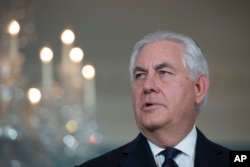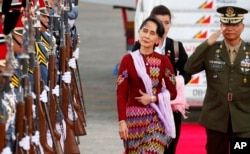The plight of hundreds of thousands of Rohingya Muslims who fled violence in Myanmar was more of a footnote than a focus when U.S. President Donald Trump mingled with Southeast Asian leaders in the Philippines.
But U.S. Secretary of State Rex Tillerson is expected to address the issue head on in a visit to Myanmar on Wednesday as calls mount for the Trump administration to adopt a stronger stance on the crisis.
Moe Thuzar, a fellow with the Singapore-based ISEAS Yusof Ishak Institute, told VOA the visit would signal a continuation of U.S. policy towards Myanmar and an indication that Trump’s administration is interested in the country as part of its overall policy towards Asia.
Though this is Tillerson’s first visit to the country and represents the most high-level outreach of the administration to date, he spoke with Aung San Suu Kyi, who serves as State Counselor and Foreign Minister, by phone in September.
Tillerson, who was also able to meet with Aung San Suu Kyi on the sidelines of overlapping summits Tuesday in Manila, will hold talks with her and army chief Min Aung Hlaing in Naypyitaw.
Call for action
More than 600,000 Rohingya Muslims have left Myanmar’s Rakhine State since August 25, after insurgents attacked security forces and prompted a brutal military crackdown that has been described as ethnic cleansing.
Stating last month that “the world can’t just stand idly by” to allegations of atrocities against the Rohingya, Tillerson made a point of placing responsibility on Burma's military instead of the State Counselor, who must share power with the institution after leading her party to election victory in 2015.
Though Aung San Suu Kyi has been criticized for sidestepping allegations of abuses, many Western governments have been reluctant to ostracize her during a fragile transition to democracy.
During Tillerson’s meetings he plans to express concerns over the displacement and violence against the Rohingya population, according to a senior state department official who described Aung San Suu Kyi as being eager to come up with solutions.
Tillerson will also reiterate support for Myanmar, urge the government to protect local populations, push for unfettered access to northern Rakhine State for a credible investigation of abuses, and encourage the government to create safe conditions to allow refugees to return to their homes.
While U.S. lawmakers have proposed legislation to introduce targeted sanctions against military interests, the Trump administration has yet to embrace the measures. And even though he spoke with Min Aung Hlaing in late October to voice concerns about the violence, Tillerson has resisted describing it as ethnic cleansing.
Mark Farmaner, director of the London-based Burma Campaign UK, said the Trump administration has done “very little to pressure either the government or the military in Burma over the Rohingya crisis,” and the visit will send important signals one way or the other.
“Failing to take a strong stance will be interpreted as weakness by the military, and seen as a green light to continue abuses,” Farmaner said. “Tillerson has to make clear to Aung San Suu Kyi that her government must stop its policy of denial and commit to giving Rohingya full citizenship if it wants continued support from the U.S.”
Other issues
Benedict Rogers, a human rights activist and the East Asia team leader with Christian Solidarity Worldwide, said the United States and the international community should also confront separate, but related, problems.
“It is very important that, while focusing on the current crisis in Rakhine State and urging the military to stop its campaign of ethnic cleansing, Secretary Tillerson also addresses Myanmar’s other challenges, in particular the conflict in Kachin and northern Shan states and the suffering of civilians in those areas, and religious intolerance in the country as a whole.”
Myanmar’s government has repeatedly rejected claims that atrocities, including rape and extrajudicial killings, are occurring in northern Rakhine, the epicenter of the violence.
Authorities blame the Arakan Rohingya Salvation Army, the poorly armed insurgents who first emerged with deadly attacks in October 2016 that killed at least nine border guard officials, followed by a similarly deadly operation in August.
The military said in a Facebook post this week that hundreds of terrorists had been killed, but the armed forces did not target civilians. “The security forces were only fighting against the ARSA Bengali terrorists. They never shot at the innocent Bengalis,” the post read in part.
Myanmar does not recognize the Rohingya and denies them citizenship, referring to them as “Bengali” to imply origins in Bangladesh.






